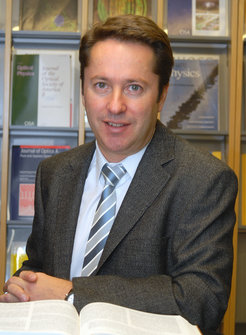Prof. Ignacio Cirac receives Max-Planck Medal from the German Physical Society
The Max-Planck medal is the most prestigious award of the German Physical Society (DPG) for outstanding performances in the area of theoretical physics. It is given once a year to a brilliant scientist who is following in the tracks of Max in the area of theoretical physics. It is given once a year to a brilliant scientist who is following in the tracks of Max Planck.
Prof. Cirac will receive the prize – a handwritten certificate on parchment with the wording of the eulogy, and a gold medal bearing a portrait of Max Planck –at an award ceremony on 7 March 2018 on the occasion of the annual meeting of the DPG in Erlangen.

A strong focus of Prof. Cirac’s research is the simulation of the behaviour of quantum many-body systems with ultracold atoms in optical lattices. For example, such systems can serve as models for solid states crystals. This work will lead to a better understanding of macroscopic phenomena such as magnetism and superconductivity, but it also aims to get a deeper understanding about the true nature of light and matter.
At the centre of Prof. Cirac’s research is also the development of a new information theory based on the laws of quantum mechanics. New ways of controlling the world of atoms, molecules, and photons are being explored in order to exploit their quantum mechanical properties for storing and communicating quantum information with ever higher efficiency and security. These investigations are leading to new concepts for future quantum computers. The Theory Division of Prof. Cirac has for example developed new concepts for logical elements such as quantum gates that have already been implemented by experimental physicists. Furthermore, the group develops new algorithms for quantum communication, designs new quantum networks making use of the special properties of quantum particles, and creates new theoretical tools to characterize and quantify e.g. entanglement of remote quantum systems.
Information on Ignacio Cirac:
Professor Ignacio Cirac was born in the City of Manresa in 1965. He studied theoretical physics at the Universidad Complutense de Madrid where he received his PhD in 1991. He began his career in physics as a “Professor Titular” at the Universidad de Castilla-La Mancha where he stayed till 1996. In 1996 he became Professor at the department of Theoretical Physics at the University of Innsbruck. Since 2001 he has been Director at the Max Planck Institute of Quantum Optics and head of the Theory Division.
Professor Ignacio Cirac is a world-expert in the field of quantum information and quantum computation. In 2005 he was awarded the “Quantum Electronics Prize” of the European Science Foundation. In May 2006 he was the youngest ever winner of the renowned Royal Spanish Prince of Asturias Prize, and in the same year he received the International Quantum Communication Award together with Professor Peter Zoller (University of Innsbruck). In 2009 he shared the “Frontiers of Knowledge Award in Basic Sciences” of the Spanish BBVA Foundation as well as the Benjamin Franklin Medal of the Franklin Institute in Philadelphia (USA) with Professor Peter Zoller. In January 2013 he received both the Israeli Wolf Prize and the Niels Bohr Medal. In 2014, Prof. Cirac received the Honorary Doctor from the University of Zaragoza. In 2015 he got the Hamburg Prize for Theoretical Physics. In January 2016 he was elected ordinary member of the Royal-Spanish Academy of Sciences, and in October 2016 he received the Honorary Doctorate from the Universidad Europea de Madrid. In May this year Prof. Cirac became elected member of the Nationale Akademie der Wissenschaften Leopoldina. Olivia Meyer-Streng












